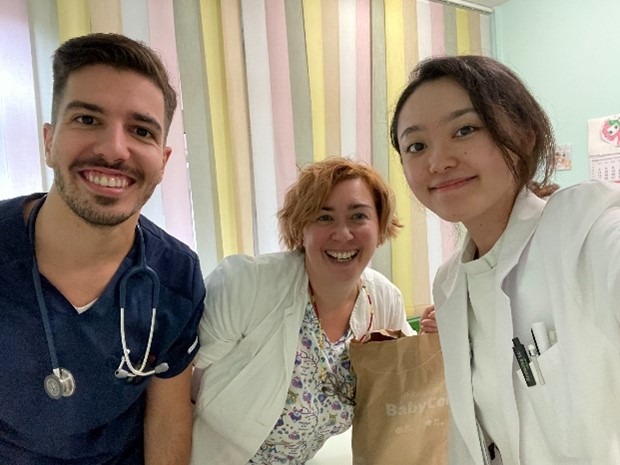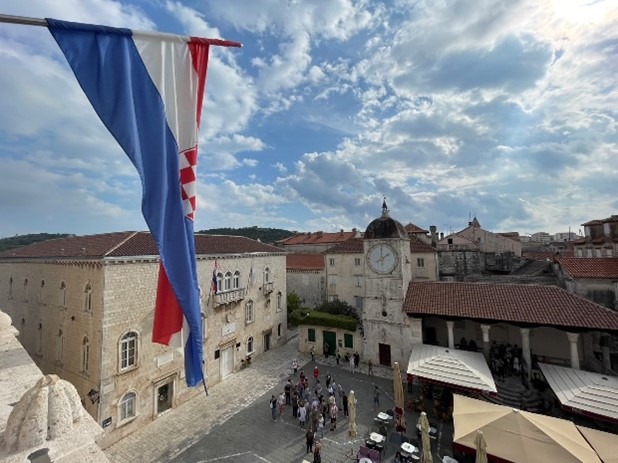International and Domestic exchange
Yuki Takeda (5th grade)
After completing my studies at the University of Rijeka in Croatia
I did clinical training at the Clinical Hospital Center Rijeka in South Europe, Croatia, as an exchange student of the University of Rijeka, between our school and South Europe, for four weeks from September 25 to October 20. The training sites were Rijeka, Susak, and Kantrida, and I did my training in Internal Medicine for the first two weeks and Pediatrics for the next two weeks.
In the Department of Internal Medicine, I spent the first week in Susak, working in the cardiology, nephrology, respiratory and rheumatology departments. In the second week, I spent the second week in Rijeka, working in the gastroenterology, diabetes, endocrinology and hematology departments. I participated in every ward round. Unlike in Japan, the beds in the ward are not separated by curtains, so the contents of the rounds are open to the whole room. Therefore, everyone understands and feels the current situation of the others, and they look at each other and nod to each other, so every ward has a warm, family-like atmosphere. During rounds, I am allowed to interview the hospitalized patients, auscultate their respiratory sounds, and give my opinion on the occasion. When my opinion on this occasion coincided with the doctor's findings, I felt more cheerful than happy. There were two glass bottles on the table next to the patient's bed in the ward, one containing water and the other containing tea. When the doctor said, "Many patients like black tea," I felt that the word "black tea" was standard and "European." The doctors have a daily routine of taking a coffee break after their morning ward rounds and then carrying out their tasks for the day. By participating, the doctor in charge and other doctors who were not good at English were able to communicate in English, so I was able to ask questions I had in the hospital and receive detailed information. In this cardiology IVR room, pacemaker implantation is performed by a two-person team of one doctor and one operating nurse. The doctors also explained the types of pacemakers to me in detail, which was very educational. I felt that communicating with foreign doctors had given me some kind of opportunity for my future.
In the pediatric department, I did my training in the gastroenterology department. The daily schedule was to hold a conference about hospitalized patients in the morning, then make ward rounds, and then perform outpatient and endoscopic examinations. The hospitalized patients were a variety of types, including children with IBD diseases such as ulcerative colitis, children with acute pancreatitis, and infants with weight loss as their main complaint, and I was treating all gastrointestinal, hepatic, gallbladder, and IBD diseases as a gastroenterologist. In the gastroenterology outpatient department, I had the impression that there were a lot of patients with celiac disease, an autoimmune disease against gluten. Celiac disease is very rare in Japan, at 0.05%, but in Croatia, it is so common that it is always listed as a differential diagnosis if there are digestive symptoms such as diarrhea or abdominal pain. The staple food in Japan is rice, but in Croatia, people often eat foods that contain a lot of gluten, such as bread and pasta, so it was very interesting to see how common diseases in each country differ depending on the difference in food culture. My supervisor is also a certified dietitian, and he told me, "For diseases that can be cured with dietary therapy, I try to treat them without using drugs as much as possible, taking into account the risks of drugs." Since children are more susceptible to side effects from drugs than adults, I was impressed by his approach to patients, which is very pediatric. Here, I was able to go to the hospital rooms by myself and perform abdominal examinations on hospitalized patients. The doctor and the patients themselves readily agreed to the examination, so it was a wonderful experience, just like in internal medicine. In particular, during my training in pediatrics, I felt like I was already a female doctor, as I went to the hospital rooms by myself, palpated and talked to the patients, and the two weeks went by in a flash.
I stayed in the Rijeka University dormitory, and every meal was prepared in the dormitory cafeteria in a buffet style. All the students in the dormitory were friendly, and when I was waiting for my laundry to finish in the laundry room, a stranger asked me, "If you're alone, would you like to have dinner with me?" In the cafeteria, my fellow students were also called out by international students from Italy, Kazakhstan, Indonesia, Korea, etc., and I joined in and exchanged information about the food culture, traditions, and modern times of each country, and after dinner, I sang with everyone on the guitar in the park. The problem during my study abroad was that the bus was not on time. At the training site, it was acceptable to be late for training because the bus was delayed, but I had always thought that being late was strictly prohibited, so I commuted to the hospital by taxi.
On my days off, I went sightseeing in Croatia every weekend with my fellow students and medical students from the University of Rijeka who participated in the study abroad program with me. In the vicinity of the university, we visited the old town of Rijeka, the old town of Zagreb, Rovinj, and Plitvice Lakes National Park. After finishing my practical training on Friday, I went to Split for three days and two nights. I visited Split city, five islands, the Blue Cave, and Trogir city. I went to almost all the places except for the tourist spot of Dubrovinik. The buildings in each old town are mostly similar with orange roofs and stone walls, but I was able to imagine the culture of each town by walking through the back alleys and looking at the churches and castles that have been preserved since the Middle Ages. There were several back alleys that looked just like the streets I saw in Western movies, and I felt a sense of healing as if my body was becoming transparent.
I feel like the experiences I gained from the Rijeka University study abroad program, from my internship at an overseas hospital and from communicating with students from overseas universities, have helped me to grasp something that will bring me closer to becoming the doctor I aspire to be. I believe that this study abroad program at Rijeka University was essential for me. I would like to express my sincere gratitude to the people at Rijeka University who allowed me to participate in this program, the people at Hyogo Medical University, Mr. Ishibashi and Mr. Kosaka who also participated, the doctors who took care of me at the Clinical Hospital Center Rijeka, Susak, and Dr. Kristina who supervised me at Kantrida Children Hospital. Thank you very much. This program broadened my horizons, and I won't forget what I have experienced here. Thank you so much for the precious experience.

